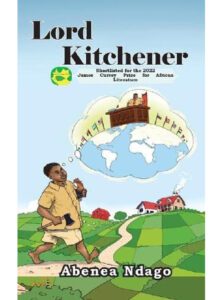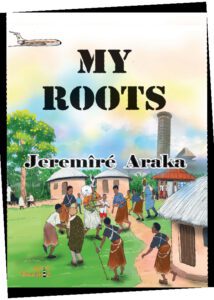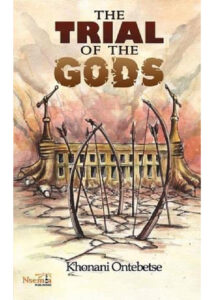
- Title: Lord Kitchener
- Year: 2023
- Author: Abenea Ndago
- Publisher: Nsemia Inc. Publishers, Ontario, Canada
- Reviewed on: August 10, 2023
Abenea Ndago’s Lord Kitchener is a harrowing tale of the failures of the modern nation-state in contemporary society. The novel extends Friedrich Nietzsche’s postmodernist conversation that cross-questions the pre-eminence of the nation-state over traditional governance. According to Nietzsche, the modern nation-state is “organized immorality internally as police, penal law, classes… externally as a will to power, to war… to revenge.” Nietzsche wonders how the nation-state is capable of executing “a host of things that the individual” cannot even imagine. Through political inventions such as the constitution, the state invokes articles to transgress ethical and moral values “through division of responsibility, command, and execution.” Nietzsche’s tenets traverse Ndago’s Lord Kitchener to interrogate this facet of modernism through his careful selection of form and content.
Set in Kenya, soon after independence, Lord Kitchener focuses on the lives of Ombam and Engineer Okwach to address social and political issues. Whereas Ombam plays the aesthetic role in the depiction of social problems (corporal punishment, sickness and ignorance), the story of Okwach delves into Nietzsche’s exposition of the excesses of the modern nation-state including paranoia, “intellectual sleepiness and mediocrity”, which curtail progress in young African nations. His further education notwithstanding, Okwach becomes sycophantic out of the desire for material aggrandizement at the expense of the denial of fundamental rights and freedoms by the nation-state. For him, the state’s resolve to create classes through negative ethnicity, and abuse of police and law through the political assassination of Panaji, Orma, and Bajuni is sensible as long as it enables him to acquire material wealth. However, obsessed with paranoia, the state turns the instruments of power against Okwach when he tries to assist Vice K’s supporter to escape to Ethiopia. Okwach is tortured, sacked and reduced to abjection when the state reclaims all his property.
As aforementioned, the novel’s subject revolves around the demerits of the modern nation-state as suggested by Nietzsche. In Ndago’s Lord Kitchener, the modern state in Africa is presented as “organized immorality” because it manipulates instruments of power to transgress ethical values through murder, assassinations, theft and ethnic marginalization. Ndago exposes the assassination of competent leaders in Kenya (member Orma, Bajuni, Ogiek, Panaji); the so-called “stoic hangings” in the Democratic Republic of Congo (Patrice Lumumba, Emmanuel Bamba, Evariste Kimba, Jerome Anany); in Uganda, Milton Obote directs Idi Amin to assassinate the Kabaka; in Nigeria, Prime Minster Abubakar Tafawa Balewa is assassinated. The nation-state in the United States perpetrates racism by manipulating police to murder Blacks – Emmett Till, and the Attica Prison murders. Similarly, the modern nation-state in Kenya forms an ethnic association that compels youth from President O’s ethnic group to take an oath to retain power in his family and use violence against other communities. At the social level, the nation-state in Kenya favours its sycophants (like Okwach and Mr. QC) to get lucrative jobs and acquire land and wealth while critics are sacked and detained. The tall dark man is sacked for supporting Vice K and becomes a pauper. The police shoot citizens who demonstrate after the assassination of Member Orma by invoking a constitutional provision. This reiterates Nietzsche’s assertion that the modern nation-state encourages “conformity, intolerance at every level, general mediocrity and intellectual sleepiness.”
At the level of form, Ndago uses a captivating plot, language and characterization selection to depict his subject in the novel. The plot is nonlinear; it skips from the central plot to sub-plots within chapters to demonstrate the pathological nature of the characters. Okwach for instance is narcissistic and therefore ineligible to lead. Full of himself, he refuses to assist his nephew, Otiwa despite the latter’s mother’s sacrifices to help Okwach succeed. Sometimes he addresses himself in the third person. For example, he tells his wife “Engineer Okwach did not have a choice” when she interrogates him for giving the home as collateral. According to Andrew Malone, this is illeism ?? used to suggest characters are victims of self-fragmentation or pathology. Okwach symbolizes the modernist political elite that is too selfish and proud to reach out to the society they serve for change. Ombam represents the Kenyan society that is so sick, naïve and relegated that it cannot make progress. His stomach upsets that compel him to occasionally pass wind represent mass stupidity that stems from marginalization. Dennis represents the favoured class such as President O’s cronies and sycophants like Okwach. The title “Lord Kitchener” represents the excesses of nation-states (paranoia, intolerance, intellectual sleepiness, mediocrity and others) in Africa. The new African leadership replaced the colonialist to perpetuate intolerance and economic crimes.
Ndago’s Lord Kitchener is a timely novel that enables us to interrogate the hyped merits of the modern nation-state in Africa.
Lord Kitchener was shortlisted for the 2022 James Currey Prize for African Literature.
Andrew Nyongesa, Lecturer of Postcolonial Literatures, Murang’a University of Technology








